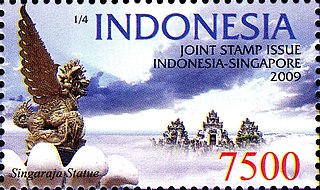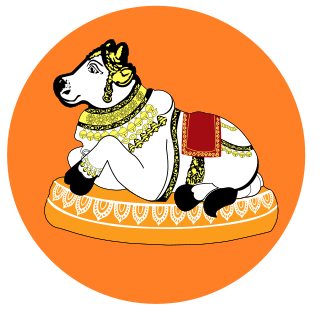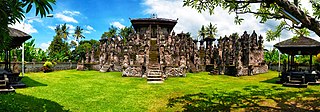Related Research Articles

Singaraja is a port town in northern Bali, Indonesia, which serves as the seat of Buleleng Regency. The name is Indonesian for "Lion King". It is just east of Lovina, and is also the centre of Buleleng District, which covers an area of 46.94 km² and had a population of 150,210 in 2020, the second largest on the island.

The pañcānana, also called the pañcabrahma, are the five faces of Shiva corresponding to his five activities : creation, preservation, destruction, concealing grace, and revealing grace. The names, qualities, and attributes of these five aspects of Shiva are described in the Śaiva agamas and puranas.
Anak Agung Pandji Tisna, also known as Anak Agung Nyoman Pandji Tisna, I Gusti Nyoman Pandji Tisna, or just Pandji Tisna, was the 11th descendant of the Pandji Sakti dynasty of Buleleng, Singaraja, which is in the northern part of Bali, Indonesia. He succeeded his father, Anak Agung Putu Djelantik, in 1944.

Buleleng is a regency (kabupaten) of Bali, Indonesia. It has an area of 1,365.88 km2 and population of 624,125 at the 2010 census and 791,910 at the 2020 census. Its regency seat is at the town of Singaraja.

Bima Sakti Tukiman is a former Indonesian football player and currently head coach of Indonesia U-17. He was named after the galaxy Milky Way, called "Bima Sakti" in Indonesian language.
Agung Anom (Mengwi) was king of the Balinese Kingdom of Mengwi. Agung married a princess from the powerful northern kingdom of Buleleng, a daughter of Panji Sakti and used this alliance to extend Mengwi's dominion into Blambangan in eastern Java. He was descended from Gusti Agung, a minister of the Gelgel kingdom who had overthrown its last king in the mid-17th century.
Icchā śákti is a Sanskrit term translating to free will, desire, creative urge. Icca sakti is the power of desire, will, longing, wishing. When iccha sakti merges with kriya sakti, the power of action, manifestation, creation, they together generate jnana sakti, the power of knowledge and wisdom.

Dalem Segening was a king of Bali who reigned in the first half of the 17th century, his exact dating being still uncertain. He belonged to a dynasty which originated from Majapahit on Java, and ruled from the palace (puri) of Gelgel.
Anglurah Agung, also known as Gusti Agung Di Made or Gusti Agung Maruti, was a king of Gelgel, the paramount kingdom on Bali, who ruled at a time when the political unity of the island began to break down. This process led to the permanent division of Bali into several minor kingdoms by the late 17th century.
Gerokgak is a district (kecamatan) in the Buleleng Regency in northern Bali, Indonesia which includes Desa Pemuteran, Sumberkima and Pejarakan, Buleleng Barat.

The Dutch intervention in Bali in 1849 was a major Dutch military intervention in Northern and Southern Bali, following two failed interventions, the 1846 intervention and the 1848 intervention. The Dutch used as a pretext Balinese salvage claims over shipwrecks, which were customary to the Balinese, but unacceptable under International law.
I Gusti Ketut Jelantik (-1849) was a Balinese Prime Minister of the state of Buleleng, who resisted the imposition of Dutch treaties.
Balinese Kshatriya is a Hindu Kshatriya community which exists in the island of Bali in Indonesia. During the second half of the sixth century, Bali had a strong Kshatriya ruling dynasty. The rulers were mostly indigenous Balinese with some Indian blood. These clans mostly belonged to the Nāgavanshi dynasty. However, in due time, these indigenous Kshatriyas became extinct and were replaced by the Javanese Kshatriyas who immigrated to Bali. Most of the Kshatriyas now living in Bali are claimed to be the descendants of the King Dewa Agung, who immigrated to Bali from Java. However, there are also a few other Kshatriya clans who were elevated to the Kshatriya status from the Vaishya varna. All together, Kshatriyas constitute around 4% of the total Balinese Hindu population.

Pratyabhijñā or Pratyabhigyā is an idealistic, monistic, and theistic school of philosophy in Kashmir Shaivism which originated in the ninth century CE. The term Trika was used by Abhinavagupta to represent the whole of Kashmir Shaivism, or to designate the Pratyabhijñā system.

Dutch intervention in Bali of 10–26 December 1858 was the fourth punitive expedition of the Royal Netherlands East Indies Army (KNIL) on the island. This expedition was directed against certain chiefs (pungawwa) of Buleleng who were fomenting revolt and opposition to the Dutch-appointed regent.
Sakti may refer to:

The Malaysia Makkal Sakti Party is a political party in Malaysia that seeks to champion ethnic Malaysian-Indian issues. MMSP is an offshoot but unaffiliated of the apolitical NGO of Hindu Rights Action Force (HINDRAF) formed by its former coordinator R.S. Thanenthiran and his detractors faction aligned to the ruling Barisan Nasional (BN)'s United Malays National Organisation (UMNO) government then whoes actrocities the movement had been fighting against. It had even copied the NGO's slogan of People's Power as the party name.

Pura Beji Sangsit is a Balinese temple or pura located in Sangsit, Buleleng, on the island of Bali, Indonesia. The village of Sangsit is located around 8 kilometres (5.0 mi) east of Singaraja. Pura Beji is dedicated to the rice goddess Dewi Sri, and is revered especially by the farmers around the area. Pura Beji is an example of a stereotypical northern Balinese architecture with its relatively heavier decorations than it is southern Balinese counterpart, and its typical foliage-like carvings.
Sakti Legislative Assembly constituency is one of the 90 Legislative Assembly constituencies of Chhattisgarh state in India.
The 1815 Bali earthquake occurred on November 22 between 22:00 and 23:00 local time (WITA), affecting the Bali Kingdom. The estimated moment magnitude 7.0 earthquake struck off the north coast of Bali at a shallow depth. It was assigned a maximum intensity of IX (Violent) on the Mercalli intensity scale, causing severe damage in Buleleng and Tabanan. The earthquake caused a landslide and tsunami that killed 11,453 people.
References
- ↑ H.J. de Graaf, 'Goesti Pandji Sakti, vorst van Boeleleng', Tijdschrift voor Indische Taal-, Land- en Volkenkunde 83:1 1949.